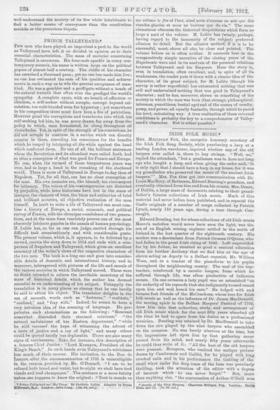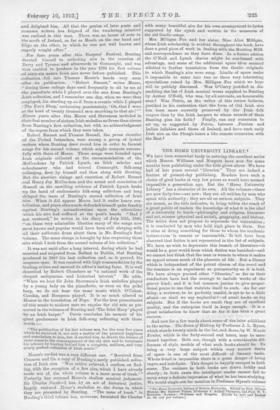IRISH FOLK MUSIC.*
Mits. Mil.a.fasaf Fox, the energetic honorary secretary of the Irish Folk Song Society, while purchasing a harp at a leading London warehouse, inquired whether any of the old harpers ever, called in there to buy strings. "Well, no,'' replied the attendant, "but a gentleman was in here not long- ago who bought a harp, and when giving the order said,-4Ia is only right that I should have a harp in my house, for it was my grandfather who preserved the music of the ancient Irish harpers." Mrs. Fox thus got into communication with Dr. Louis MacRory, of Battersea, Edward Bunting's grandson, and eventually obtained from him and from his cousin, Mrs. Deane,. of Dublin, a large mass of documents relating to their grand- father's famous collections of Irish music:. . Much of this. material had never before been published, and in especial the, Gaelic. originals of a number of songs collected by Patrick Lynch, nearly 110 years ago, during a tour through Con. naught.
Edward Bunting, but for whose collections of old Irish music Moorc's melodies would never have seen the light, was the son of an English mining engineer settled in the north of Ireland in the last quarter of the eighteenth century. His mother was a descendant from Patrick Grua= O'Quinn, who had fallen in the great Irish rising of 1642. Left unprovided for by his father, he received so good a musical education' from his brother Anthony that we find him at the age of eleven acting as deputy to a Belfast organist, Mr. William, Ware, and as a teacher Of the pianoforte to his pupils throughout the neighbouring county. The zeal of the boy. teacher, reinforced by a caustic tongue, from which he suffered through life, was often productive of ludicrous scenes. On one occasion a lady pupil was so astonished " the audacity of his reproofs that she-indignantly turned round upon him and well boxed his ears." He lodged with and became fast friends of the McCraokens, whose love for Irish folk music as well as the influence of Dr. James MacDonnell, the moving spirit in the Belfast Harpers' Festival of •1792; drew him into that collection, study, and arrangement or old Irish music which for the next fifty years absorbed al? the time he had to spare from his duties as a profession! musician. Bunting was retained by Dr. MacDonnell to take' down the airs played by the nine harpers who assembled on the occasion. He was barely nineteen at the time, but the impressions left upon him by that gathering never passed from his mind, and nearly fifty years afterwards. he could thus write of it: "All the best of the old harpers were present. Hempson, who realized the antique picture drawn by Cambrensis and Galilei, for he played with long crooked nails and in his performance the tinkling of the small wires under the deep tones of the bass was peculiarly thrilling, took the attention of the editor with a degreer of interest which • he can never forget.'" But, more -
than anything else, "the conversation of Arthur O'Neill won,
" Annals af, the Irish Havre. Charlotte Milligan Pox. London graft,* Elder and Co. [7s. 6d. not.]
and delighted him. All that the genius of later poets and .romance writers has feigned of the wandering minstrel was realized in this man. There was no house of note in the north of Ireland, as far as Meath on the one hand and Sligo on the other, in which he was not well known and eagerly sought after."
.For four years after this Harpers' Festival, Bunting -devoted himself to collecting airs in the counties of Derry and Tyrones-and afterwards in Connaught, and was thus enabled to 'produce in the year 1796 his first volume aof sixty-sit siative Irish airs never before publiahod. This soollection .fell into Thomas Moore's hands very soon • after its publication. "Robert Emmet," writes Moore,
4' during these college days used frequently to sit by me at the pianoforte while I played over the airs from Bunting's Irish collection, and I remember one day, when we were thus „employed, his starting up as if from a reverie while I played
" The Fox's Sleep,' exclaiming passionately, Oh, that I were sat the head of twenty thousand men marching to that air " rEleven years after this Moore and Stevenson included in their first number of sixteen Irish melodies no fewer than eleven from Bunting's first collection, but with no acknowledgment 'of the source from which they were taken.
Robert Emmet and Thomas Russell, the pram chevalier
of the United Irelanders, were among a group of lyrical writers whom Bunting drew round him in order to furnish diongs for his second volume which might compete success- fully with those of Moore. These songs were founded upon
Irish originals collected at the recommendation of the .McCrackens by Patrick Lynch, an Irish scholar and schoolmaster . who had toured Connaught, folk-song -collecting, first by himself and then along with Bunting. But the abortive risings and execution of Robert Emmet and Henry Joy McCracken and the arrest and conviction of Russell on the unwilling evidence of Patrick Lynch broke up the band of enthusiastic folk-song collectors and long
delayed the issue of Bunting's second collection of Irish airs. When it did appear Moore laid it under heavy con- tribution, and years afterwards defended himself quite frankly against Bunting's animadversions upon the alterations which his airs had suffered at the poet's hands. "Had I met ventured," he writes in his diary of July i5th, 1840, on these very admissible liberties many of the songs now most known and popular would have been still sleeping with all their authentic dross about them in Mr. Bunting's first 'volume. The same charge is brought by him respecting thOso lairs which I took from the second volume of his collection."
It was not until after a long interval, during which he had
married and migrated from Belfast to Dublin, that Bunting produced in 1840 his last collection and, as it proved, his anagnum opus. It was received with high commendation by the leading critics and assured its editor's lasting fame. It is well
-described by Robert Chambers as "a national work of the deepest antiquarian and historical interest." He adds: "When we hear Sir John Stevenson's Irish melodies played by a young lady on the pianoforte, or even on the pedal rharp, we do not hear the same music which O'Cahan, Carolan, and Hempson played. It is as much altered as Homer in the translation of Pope. For the true presentment 'of this musio to modern ears we require the old sets as pre- served in the volumes of Bunting and 'The Irish Harp' played by an Irish harper." Petrie concludes his memoir of his great predecessor in Irish folk-song collecting with these words :—
"The publication of his last volume was, for the very few years which he survived it, not only a matter of the greatest happiness and consolation to him, but it excited him to devote the leisure of those years to the rearrangement of the old airs and to terminate his labours by leaving behind him a complete, uniform, and very tearly perfect collection of Irish music."
Moore's verdict was a very different one. "Received from Cramers and Co. a copy of Bunting's newly published collec- tion of Irish airs. Was rather relieved, I confess, on find- ing, with the exception of a few airs, which I have already made use of, the whole volume is a mere mess of trash.'" Posterity has reversed Moore's shallow musical judgment. Sir Charles Stanford has, by an act of historical justice, largely restored Moore's melodies to the forms in which they are presenixtd by Bunting. "The mesa of trash" in Bunting's third volume has, moreover, furnished Sir Charles
with many beautiful airs for his own- arrangenient to lyrics suggested by the spirit and written in the -measures of the old Gaelic soirags.
Mrs. Milligan Fox and her sister, Miss Ailed Milligan, . whose Irish scholarship is evident throughout the book, have done a good piece of work in dealing with the Bmiting MSS. and correspondence as they have done. In a future edition the O'Neill and Lynch diaries might be condensed with advantage, and some of the additional space thus secured allotted to further translation from the Gaelic originals to which Bunting's airs were sung. Limits of space make it impossible to enter into two or three very interesting speculations raised by Mrs. Milligan Fox which we hope will be publicly discussed. • Was O'Curry justified in dis- crediting the list of Irish musical terms supplied to Bunting by Arthur O'Neill, who was, by all accounts, an honourable man ? Was Petrie, as the writer of this review believes, justified in his contention that . the form of Old Irish airs has been more correctly preserved by the Irish folk singers than by the Irish harpers to whose records of them Bunting pins his faith ? Finally, can any connexion be set up, as suggested by Petrie, between Persian and Indian lullabies and those of Ireland, and have such early Irish airs as the Plough tunes a like, remote connexion with the East ?











































 Previous page
Previous page